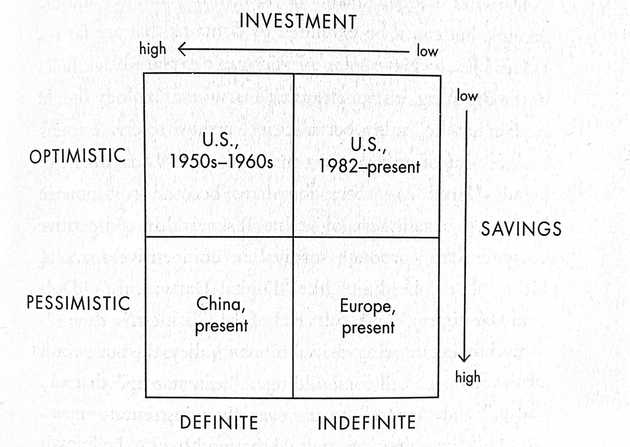Indefinite optimists' "lean startup" methodology can diminish the potential to build the future.
Book: Zero to One: Notes on Startups, or How to Build the Future
In Zero to One, Peter Thiel divides views on the future into 4 quadrants: Optimistic vs. Pessimistic, and Definite vs. Indefinite.
The four quadrants mean:
- Definite Optimism: The future will be better, and we have plans to improve it.
- Indefinite Optimism: The future will be better, but we can never know how exactly. Therefore, we don't make specific plans.
- Definite Pessimism: The future will be bleak, so we must prepare for it.
- Indefinite Pessimism: The future will be bleak, but we have no idea what to do about it.
Thiel argued that definite optimists made the world more prosperous and healthier than previously imaginable, with some examples of the Golden Gate Bridge (1933-1937), The Manhattan Project (1941-1945), and the Interstate Highway System (1956-1965).
He then contended that the US now has been defined by indefinite optimism. Instead of working for years on revolutionary products, indefinite optimists rearrange already-exist ones. Even in Silicon Valley, the idea of "lean startup", that startup should adapt and evolve to an ever-changing environment since entrepreneurs are told that nothing can be known in advance without listening to users, is not something that can work to build future.
The other three quadrants can work. Definite optimism works when you build the envisioned future. Definite pessimism works by copying things without anything new. Indefinite pessimism works because it's self-fulfilling. If you don't want to do anything, you probably will get nothing better. But indefinite optimism seems inherently unsustainable: how can the future get better if no one plans for it?
Hence, Thiel said that the common belief in modern software practice in incrementalism, that the best way forward is small, iterative, adjacent steps, can diminish potential. Making small changes to existing things might lead you to a local maximum, but it won't help you find the global maximum.
You could build the best version of an app that lets people order toilet paper from their iPhone. But iteration without a bold plan won't take you from 0 to 1. In other words, to make a great company, it needs to have a concrete plan for a future that other people haven't yet imagined.
